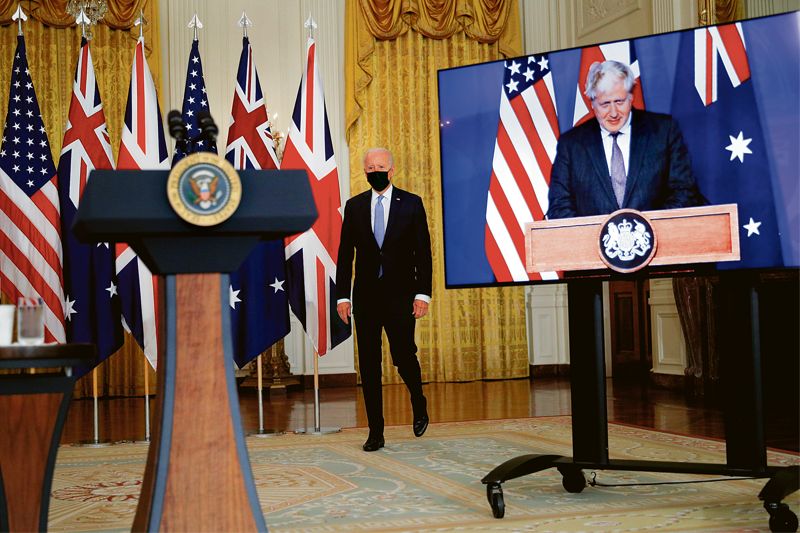
AUKUS: Yet another anti-China grouping created by the US. Reuters
Sudheendra Kulkarni
Former close aide to ex-PM Vajpayee and Founder, Forum for a New South Asia
GURUDEV Rabindranath Tagore would have been an unhappy man were he alive today. A poet-philosopher who relentlessly advocated Asian unity, he would have been utterly distressed by the disunity and conflicts in Asia, and the current efforts by Western powers to mire the continent in bloc rivalry.
No other Indian leader of his times visited as many Asian countries as he did — Japan (1916, 1924, 1929), Burma (1916, 1924, 1927), Sri Lanka (1922, 1928, 1934), China (1924, 1928), Singapore (1916, 1924, 1927), Indonesia (1927), Malaysia (1924 and 1927), Thailand (1927), Vietnam (1929), and Iran and Iraq (1932).
His mission was to ‘create an Asian mind’. When he established Visva-Bharati in 1921, his principal goal was to revive the age-old civilisational, cultural and spiritual bonds that linked India and other Asian countries. He was not the only Indian who had this vision. Mahatma Gandhi, Jawaharlal Nehru and Subhas Chandra Bose also espoused Asian solidarity.
‘The Asian Mind’ of Gurudev’s dreams is fragmented today. Countries that were once victims of colonialism have drifted apart. Asia — home to 60 per cent of the world population — is becoming increasingly non-peaceful, with Western powers trying to create competing groupings and ignite fires of conflict.
Sadly, the internal quarrels in Asia are harming peace and closing the opportunities for mutually beneficial cooperation aimed at enhancing the wellbeing of its peoples. West Asia has seen many wars in the recent past — Iran-Iraq war, the US invasion of Iraq, and the ongoing wars in Syria and Yemen. In South Asia, Afghanistan has suffered four decades of external wars and internal conflicts. Even after the recent withdrawal of American troops, there are no cooperative efforts by India and regional neighbours to help Afghanistan achieve stability and national reconstruction.
This is mainly due to Taliban’s religious fanaticism on the one hand and India-Pakistan hostility on the other. India and Pakistan are in no mood to establish good neighbourly relations even 75 years after our two countries gained independence from British rule. Because of our ceaseless enmity, SAARC (South Asian Association for Regional Cooperation), of which Afghanistan is also a member, has become completely dysfunctional and remains in coma. Its leaders have not had a summit meeting since 2014.
In contrast, China has achieved some success in making the Shanghai Cooperation Organisation (SCO) a viable non-Western platform in the region. The SCO managed to induct both India and Pakistan as full members in 2017. At its recent 20th anniversary summit in Dushanbe (Tajikistan), Iran joined it as a full member. Afghanistan has an observer status in the SCO.
Sadly, India has chosen to isolate itself from a regional cooperation endeavour involving China, Russia, Iran and Pakistan to promote peace and inclusive government in Kabul even though there is no basic difference among the five nations over the issue that the Taliban regime must not give sanctuaries to terrorist organisations.
Instead, India is aligning its Afghan policy with that of America. More worrisome is America's reported attempt to seek a military base at some place in ‘north-west India’ for carrying out ‘over-the-horizon counter-terrorism operations’ in Afghanistan. Agreeing to this would be catastrophic for India and the region. It would also expose us to the criticism of following double standards. India has been rightly insisting that the Taliban should not allow Afghan soil to be used against India. How, then, can we allow the USA's anti-Afghan operations from Indian soil?
Let's look at another major intra-Asian antagonism. India and China, the two great Asian civilisations, are locked in a power struggle, which, if unchecked, can be disastrous for both as well as the continent and the world. India-China rivalry, coupled with China’s failure to peacefully resolve maritime disputes with its neighbours in South China Sea, has given an opportunity for the distant US to fish in troubled waters.
America has no business getting involved in Asian disputes. Yet, invoking the artificial concept of the ‘Indo-Pacific’, which gives India’s westernised ruling elite a feel-good sense of gaining global leadership, Washington has persuaded the Modi government to offer it a foothold in the India-China row.
Since the end of World War II, US rulers have been acting on the belief that their country is the global hegemon and, as such, have the right to flaunt its power anywhere in the world.
However, with the rise of China in recent decades, the days of US global domination are clearly numbered. Alarmed by this certainty, it is busy sowing the seeds of disunity in Asia. For this purpose, it is building military groupings to contain China.
Unfortunately, we Indians, instead of sorting out our disputes with China on our own on the basis of equality and fairness, have chosen to join the US-led quadrilateral. Essentially an anti-China alliance, the Quad could end up making Asia the theatre of a new cold war and an expensive arms race. Should India allow outsiders to put their guns on its shoulder to fire at China? What will be the consequences of India becoming a pawn in America’s games?
America has now created yet another anti-China grouping — AUKUS, a security pact among Australia, the UK, and the US, all three being Anglosphere nations. America and Britain will help Australia develop and deploy nuclear-powered submarines to deter China.
France is extremely angry with its two NATO allies because the pact has scuttled the lucrative $80-billion French-Australian submarine deal. This shows how several western nations have now become predominantly war economies. They prosper only by selling costly weapon systems to non-western countries, including India.
Be it Quad or AUKUS, what should worry Indians and all other Asians is how our seas and oceans will increasingly become a playfield for menacing warships and submarines.
Exactly a hundred years ago, Mahatma Gandhi had warned about a future when powerful nations, using their navies, would “threaten world’s peace and exploit its resources” (Young India; December 8, 1921). His warning is now coming frighteningly true. Tagore too had warned Asians against imitating the monstrous features of the European rivalry, which triggered two horrific world wars.
India, which aspires to become a ‘Vishwa Guru’, is blissfully ignoring Gurudev’s warning, too.
Join Whatsapp Channel of The Tribune for latest updates.




























